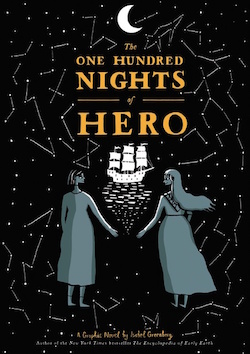Thursday Comics Hangover: Women tell stories in order to live
Last week, I was thoroughly disappointed by a comic book that was supposedly about the enduring power of stories. This week, I’m entirely enchanted by a comic that demonstrates the empowering endurance of stories. Isabel Greenberg’s hardcover comic The One Hundred Nights of Hero is a story about stories wrapped in other stories, including a Scheherazade scenario in which a woman must tell a story so compelling that it distracts a lecherous man from advancing on her, night after night.

Greenberg’s art is deceptively crude. On first glance a panel in which five sisters gather around a candle in the midst of an inky night looks as though it could be a woodcut, the lines are so primitive and scratchy. But look a little closer and you’ll see finer details. One sister’s hand is splayed out on the ground for balance, another’s finely wrought braid winds down her back.
Throughout the book, Greenberg shades scenes with splatters and sprays of ink that look at times like Jackson Pollock took control of the pen. But those sprays of ink aren’t mistakes. In fact, they serve to remind the reader that the story they’re reading is ink on paper, a happily primitive medium that Greenberg uses to great effect.
Many of these stories are about the enduring power of women, and the unthinking malevolence of men. (The moral of one story: “Men are false. And they can get away with it.”) In one story, a woman reveals to her husband that she can read by writing “I LOVE YOU” onto a fogged window; the illiterate man then concludes that his wife is a witch who has cursed him with a magical spell.
These women revel in words and stories and books:
They read aloud to each other, they wrote great, swirling sentences in ink and charcoal, in mud and paint and pencil. They luxuriated sinfully in that most beautiful of all things: The written word.
These stories do not all have happy endings, but they are all meaningful tributes to smart women who persevere even when the entire world conspires against them. These are stories of gods and sailors and lovers and, most importantly, sisters. It’s a never-ending puzzle box of stories about stories, and the important role that women play in keeping stories alive for future generations. This is a book that will teach you how to fall in love with books again.